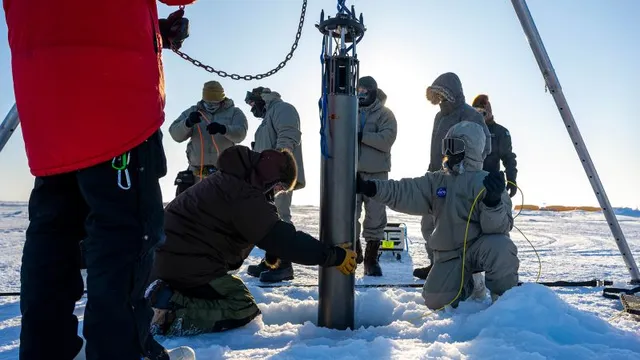
NASA robots explore Antarctica to track ice melt impact
2024-09-03 00:00- NASA is developing autonomous underwater robots to explore beneath Antarctica's ice shelves.
- These robots will monitor the melting ice and its impact on global sea levels, focusing on the vulnerable grounding line.
- The data collected will improve sea level rise projections, highlighting the urgency of understanding ice melt.
Express your sentiment!
Insights
NASA scientists are developing autonomous underwater robots to explore the depths beneath Antarctica's ice shelves. This initiative, part of the IceNode project, aims to gather crucial data on the melting ice and its implications for global sea levels. The robots, designed to operate without propulsion, will be deployed from boreholes or ships and will attach to the ice to monitor the effects of warmer ocean water on the ice structure. Recent studies indicate that Antarctica's ice is melting at an alarming rate, potentially leading to a significant underestimation of future sea level rise. The IceNode robots will focus on the grounding line, where glaciers transition to ice shelves, as this area is particularly vulnerable to melting due to warm ocean currents. The fleet of approximately 10 robots will be equipped with sensors to track the melting process and the behavior of cold meltwater. They are expected to operate for up to a year, collecting seasonal data that will enhance the accuracy of sea level rise projections. While similar robots have been used in the past, the IceNode robots will be fully autonomous, allowing for extended data collection without the limitations of tethered systems. The deployment timeline is still uncertain, but scientists are eager to begin this critical research as soon as possible to better understand the implications of ice melt on coastal communities worldwide.
Contexts
Antarctica is currently experiencing a record-breaking heat wave, occurring during a period when temperatures are typically at their lowest. This anomaly raises significant concerns among scientists regarding the health of the Antarctic region and its broader implications for global ecosystems. The unprecedented warmth is a stark indicator of the ongoing impacts of climate change, which poses serious threats to the environment and millions of people worldwide. In light of these changes, research has shown that gentoo penguins are adapting to the warming conditions in Antarctica. Studies by Marc Cieslak highlight the innovative strategies these penguins employ to thrive despite the environmental challenges they face. Their resilience underscores the urgent need for conservation efforts as the climate continues to change rapidly. The exploration of Antarctica by NASA robots aims to track the effects of ice melt, which is a direct consequence of rising temperatures. Understanding these dynamics is crucial for predicting future changes in the region and their potential global repercussions. Overall, the combination of record heat and the adaptability of local wildlife illustrates the complex interplay between climate change and ecological resilience, emphasizing the importance of ongoing research and conservation initiatives.